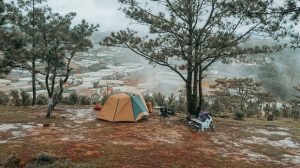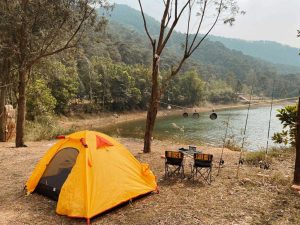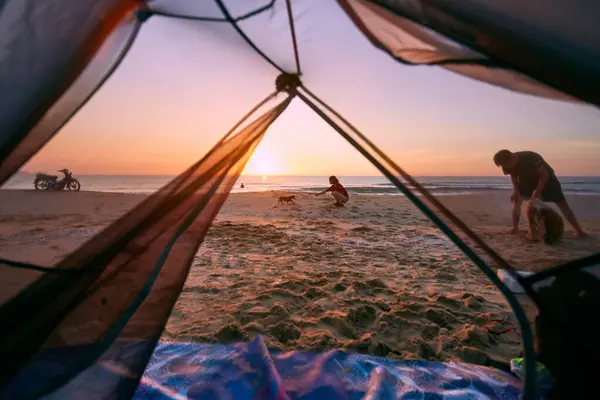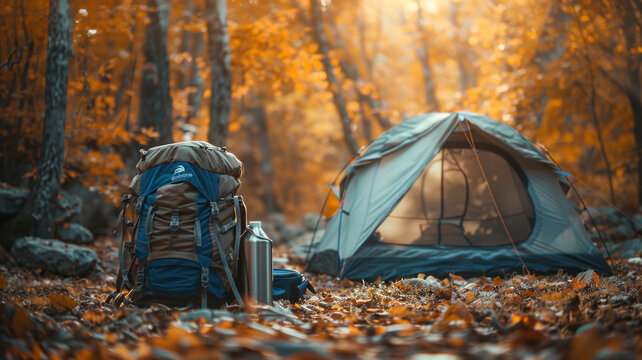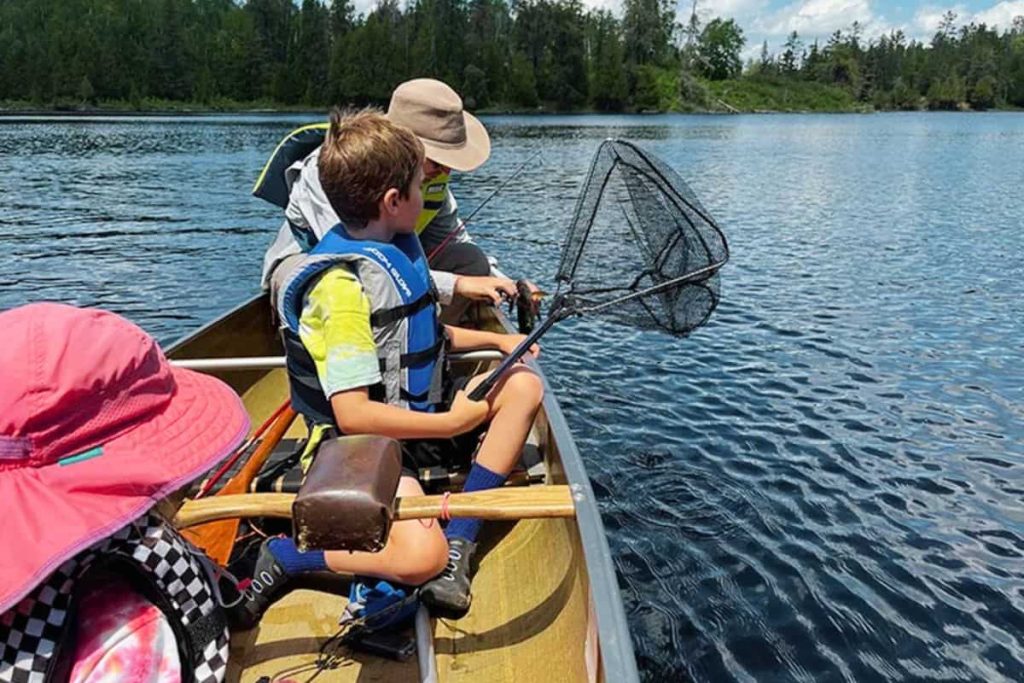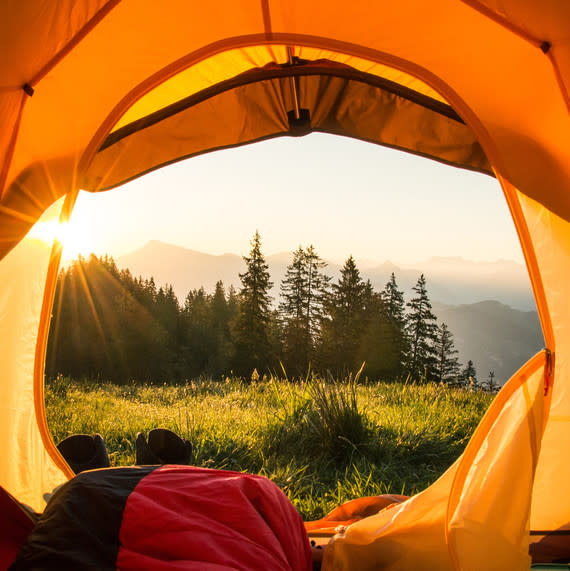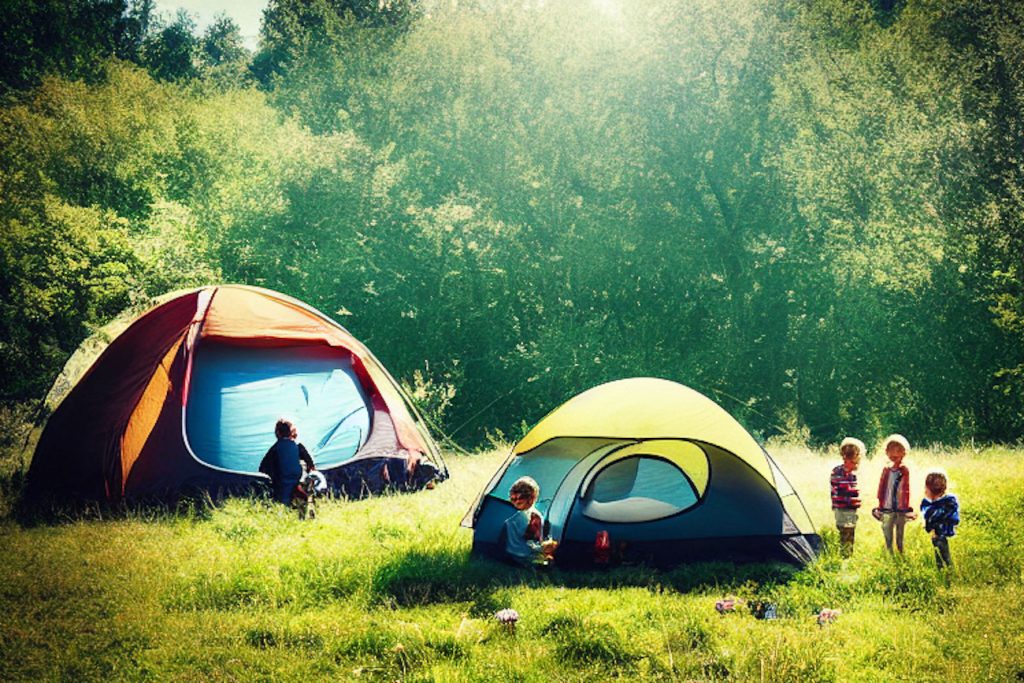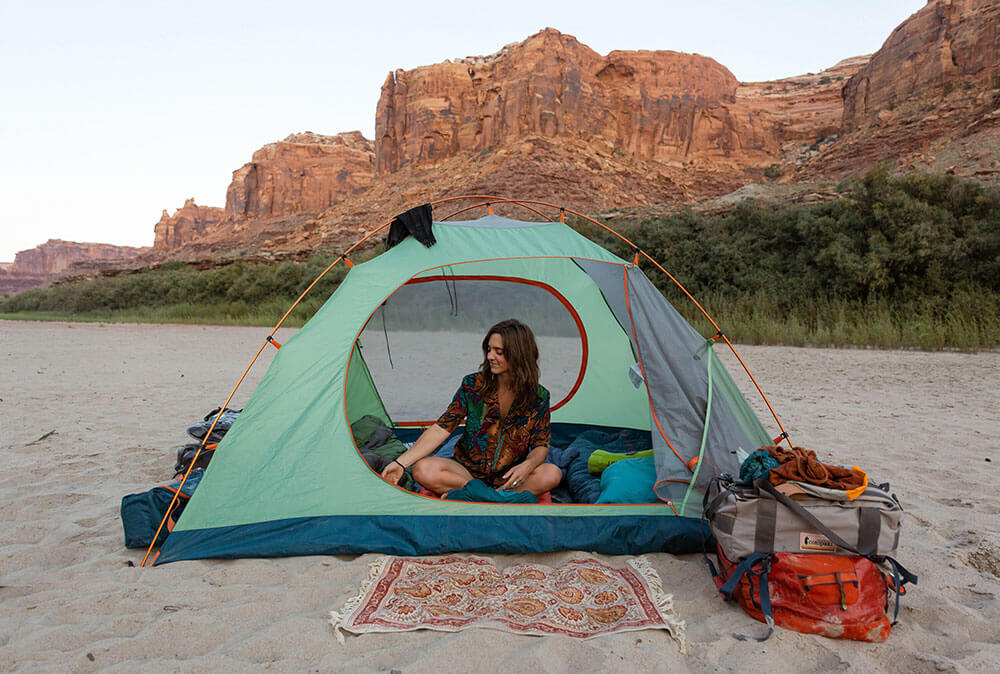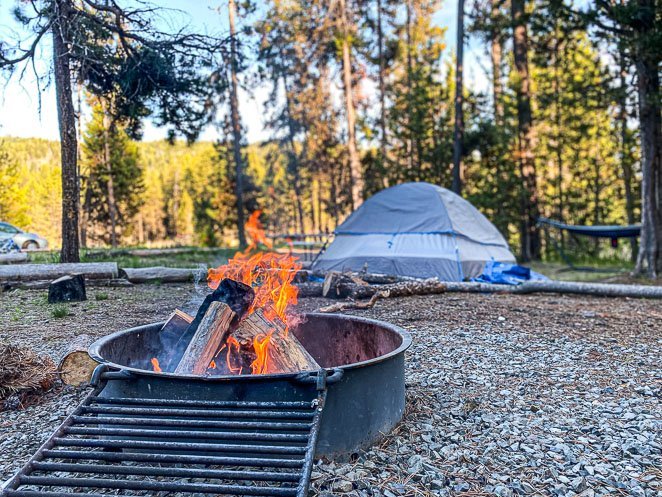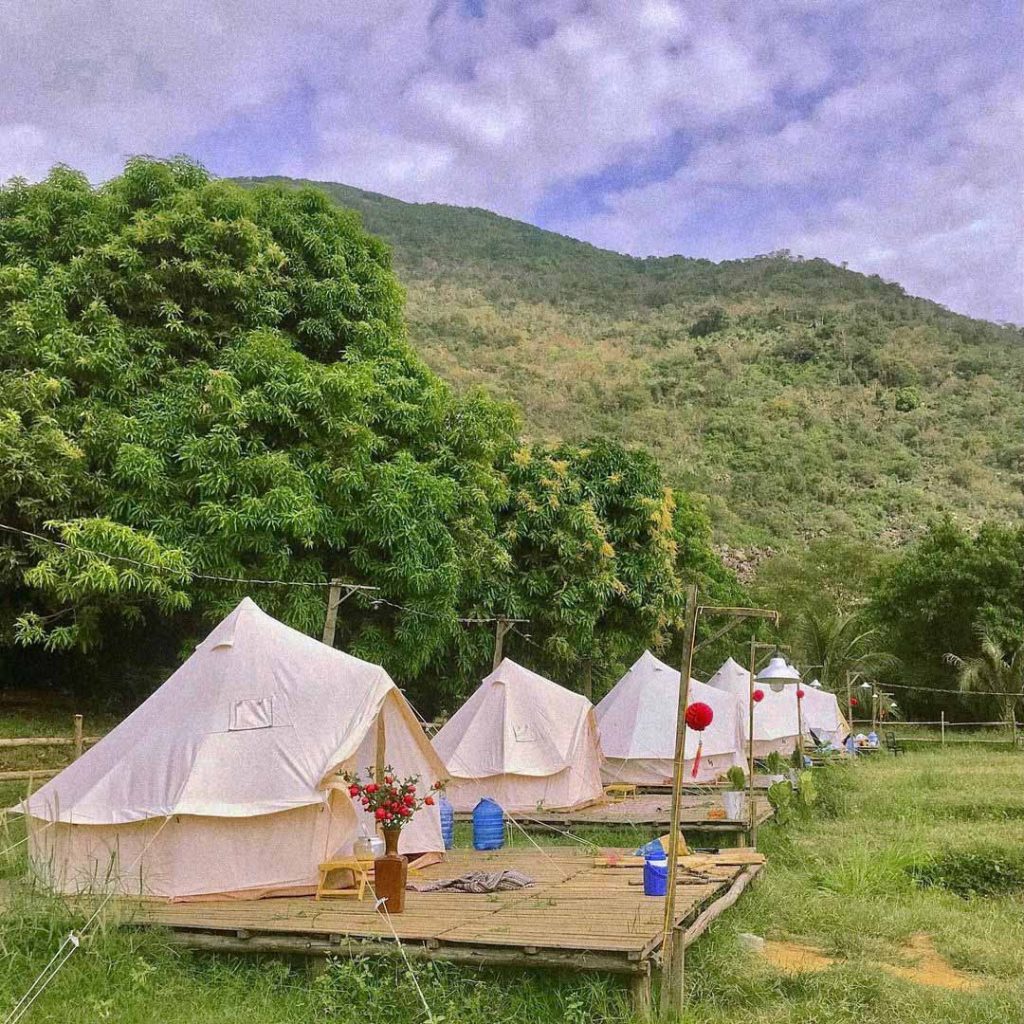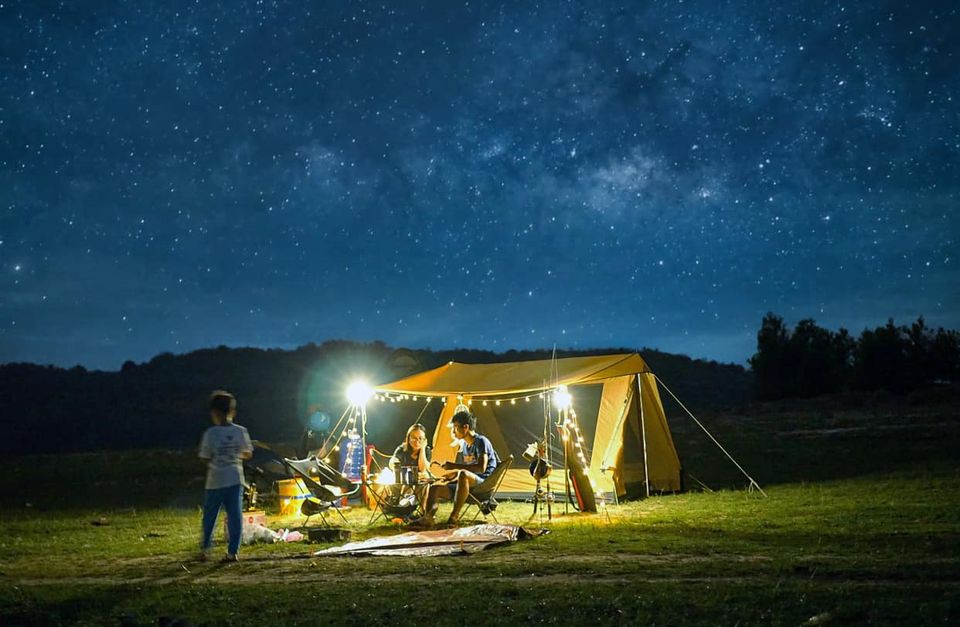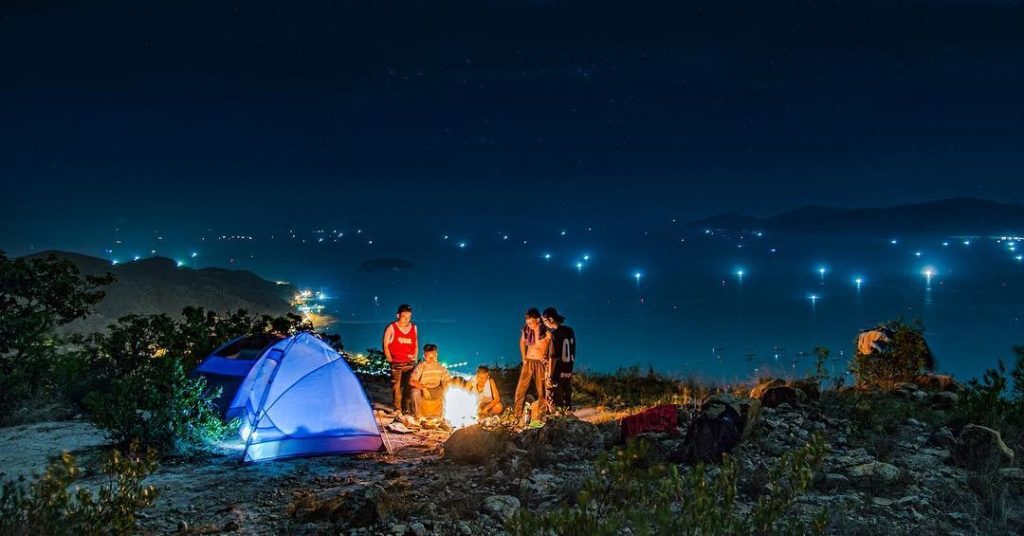Camping is one of the most rewarding ways to connect with nature and disconnect from the hustle and bustle of everyday life. Whether you’re a first-timer or a seasoned camper, this guide will help you prepare for a memorable outdoor adventure. From selecting the perfect campsite to enjoying a variety of activities, we’ve got you covered. Why Camping is Great for You Reconnect with Nature: Experience the beauty of the great outdoors, from starry skies to serene landscapes. Camping allows you to immerse yourself in nature and rejuvenate your spirit. Health Benefits: Outdoor activities like hiking, swimming, and fishing improve physical fitness. Fresh air and natural light are also known to boost mental health and reduce stress. Quality Time: Spend meaningful time with family and friends away from the distractions of technology. Camping fosters stronger relationships through shared experiences and activities. Planning Your Camping Trip Choosing the Perfect Campsite: Research: Look for campsites that match your preferences, whether you enjoy hiking trails, lakes, or scenic views. Consider the amenities available, such as restrooms and picnic areas. Reservations: Many campsites require reservations, especially during peak seasons. Book early to secure your spot and avoid last-minute hassles. Packing Essentials: Shelter: A reliable tent, a sleeping bag appropriate for the season, and a comfortable sleeping pad are must-haves. Clothing: Pack in layers to adjust to changing weather conditions. Include waterproof and warm clothing. Food and Cooking Supplies: Plan easy-to-prepare meals. Bring a portable stove, cookware, utensils, and enough food and water for your trip. Safety and Navigation: First Aid Kit: A well-stocked first aid kit is essential. Familiarize yourself with basic first aid procedures. Navigation Tools: Bring a map, compass, or GPS device. Ensure you know how to use them and have a backup means of communication. Setting Up Camp Selecting Your Campsite: Choose a flat, dry area free of rocks and debris. Avoid setting up near hazards like dead trees, cliffs, or flood-prone areas. Ensure your campsite is at least 200 feet from water sources to minimize environmental impact and protect wildlife. Pitching Your Tent: Practice setting up your tent before your trip. Ensure it is securely staked and guyed out to withstand wind and rain. Use a ground tarp or footprint to protect your tent from moisture and abrasion. Building a Campfire: Follow local regulations and use designated fire rings or pits if available. Gather small sticks and kindling to start your fire, gradually adding larger logs. Keep your fire small and manageable. Always have water and a shovel nearby to extinguish the fire completely before leaving or going to bed. Activities to Enhance Your Camping Experience Hiking and Exploration: Choose trails that match your fitness level. Bring plenty of water, snacks, and a map. Enjoy the scenery and take time to observe wildlife. Follow Leave No Trace principles by staying on marked trails and packing out all trash. Water Activities: Swimming: Find safe swimming spots free from strong currents and underwater hazards. Swim with a buddy and follow safety guidelines. Fishing: Check local fishing regulations and bring the necessary permits. Practice catch-and-release to help preserve fish populations. Nighttime Activities: Stargazing: Camping away from light pollution provides excellent stargazing opportunities. Bring a telescope or binoculars. Use apps or star charts to identify constellations. Campfire Fun: Enjoy storytelling, singing, and playing games around the campfire. Classic activities like roasting marshmallows and making s’mores add to the enjoyment. Leave No Trace Principles Plan Ahead and Prepare: Research the area and understand local regulations. Prepare for varying weather conditions and emergencies. Minimize waste by repackaging food. Travel and Camp on Durable Surfaces: Stay on established trails and camp on durable surfaces like rock, gravel, or dry grass. Avoid fragile areas like wetlands and meadows. Dispose of Waste Properly: Pack out all trash and leftover food. Use toilets if available or dig a small cathole at least 200 feet from water sources to bury human waste. Leave What You Find: Preserve the environment by leaving rocks, plants, and other natural objects undisturbed. Avoid disturbing cultural or historical artifacts. Minimize Campfire Impact: Use a camp stove for cooking when possible. Keep campfires small and use only small sticks. Ensure the fire is completely extinguished before
Author Archives: admin
Camping is a wonderful way to escape the daily grind, connect with nature, and create lasting memories. Whether you are new to camping or an experienced outdoors enthusiast, here’s a guide to help you plan and enjoy a successful camping trip. The Benefits of Camping Reconnect with Nature: Spending time outdoors allows you to appreciate the beauty of natural landscapes, fresh air, and the tranquility away from urban life. It provides a perfect setting for relaxation and reflection. Physical and Mental Health Boost: Outdoor activities such as hiking, swimming, and fishing are great for physical fitness. Additionally, being in nature helps reduce stress, improve mood, and enhance mental well-being. Quality Time with Loved Ones: Camping trips are ideal for spending quality time with family and friends. Activities like cooking together, exploring trails, and sharing stories around the campfire strengthen relationships and create unforgettable memories. Planning Your Camping Trip Choosing the Perfect Campsite: Research: Select a campsite that suits your preferences, whether it’s near hiking trails, lakes, or offers necessary amenities. Check for facilities like restrooms, showers, and picnic areas. Reservations: Popular campsites may require reservations, especially during peak seasons. Book early to secure your spot. Packing Essentials: Shelter: Bring a durable tent, a sleeping bag suited for the weather, and a sleeping pad for extra comfort. Clothing: Pack in layers to adapt to changing weather conditions. Include waterproof and warm clothing. Food and Cooking Supplies: Plan meals that are easy to prepare outdoors. Bring a portable stove, cookware, utensils, and sufficient food and water. Safety and Navigation: First Aid Kit: Carry a well-stocked first aid kit and know basic first aid procedures. Navigation Tools: Bring a map, compass, or GPS device. Familiarize yourself with the area and have a means of communication in case of emergencies. Setting Up Camp Selecting a Campsite: Choose a flat, dry area free from rocks and debris. Avoid setting up near potential hazards like dead trees, cliffs, or water bodies that could flood. Ensure your campsite is at least 200 feet away from water sources to minimize environmental impact and protect wildlife. Pitching Your Tent: Practice setting up your tent before your trip to ensure you can do it quickly and correctly. Secure your tent with stakes and guy lines to withstand wind and rain. Use a ground tarp or footprint under your tent to protect it from moisture and abrasion. Building a Campfire: Follow local regulations and use designated fire rings or pits if available. Gather small sticks and kindling to start your fire, and add larger logs gradually. Keep your fire small and manageable. Always have water and a shovel nearby to extinguish the fire completely before leaving or going to bed. Activities to Enhance Your Camping Experience Hiking and Exploration: Choose trails that match your fitness level and interests. Bring plenty of water, snacks, and a trail map. Take your time to enjoy the scenery and observe wildlife. Practice Leave No Trace principles by staying on marked trails, respecting wildlife, and packing out all trash. Water Activities: Swimming: Find safe swimming spots free from strong currents and underwater hazards. Always swim with a buddy and follow safety guidelines. Fishing: Check local fishing regulations and ensure you have the necessary permits. Bring appropriate fishing gear and practice catch-and-release to preserve fish populations. Nighttime Activities: Stargazing: Camping provides an excellent opportunity to enjoy the night sky away from light pollution. Bring a telescope or binoculars to enhance your stargazing experience. Use apps or star charts to identify constellations and planets. Campfire Fun: Gather around the campfire for storytelling, singing, and playing games. Traditional campfire activities like roasting marshmallows and making s’mores add to the fun. Leave No Trace Principles Plan Ahead and Prepare: Research the area you will be visiting and know the regulations. Prepare for extreme weather, hazards, and emergencies. Minimize waste by repackaging food and using reusable containers. Travel and Camp on Durable Surfaces: Stay on established trails and camp on designated sites or durable surfaces like rock, gravel, or dry grass. Avoid fragile areas like wetlands and meadows. Dispose of Waste Properly: Pack out all trash, leftover food, and litter. Use toilets if available, or dig a small cathole at least 200 feet away from water sources and trails to bury human waste. Leave What You Find: Preserve the natural environment by leaving rocks, plants, and other natural objects as you found them. Avoid disturbing cultural or historical artifacts. Minimize Campfire Impact: Use a camp stove for cooking and minimize the use of campfires. If you do build a fire, keep it small, use only small sticks, and ensure it is completely extinguished before leaving. Respect Wildlife: Observe animals from a distance and never feed them. Store food and trash securely to avoid attracting wildlife to your campsite. Be Considerate of Other Visitors: Respect other campers by keeping noise levels down and following campground rules. Yield to other hikers on trails and be mindful of shared spaces. Camping offers a unique opportunity to connect with nature, relax, and create unforgettable experiences. By preparing thoroughly and following responsible camping practices, you can ensure a safe, enjoyable, and environmentally-friendly camping experience.
Camping offers an excellent opportunity to disconnect from the digital world and embrace the great outdoors. Whether you’re a seasoned camper or a beginner, this guide will help you plan a successful and enjoyable camping trip. Why Go Camping? Connection with Nature: Camping allows you to immerse yourself in the natural environment, which can be incredibly refreshing and rejuvenating. The sights, sounds, and smells of nature provide a much-needed break from urban life. Physical and Mental Health Benefits: Engaging in outdoor activities like hiking, swimming, and fishing can improve your physical health. Exposure to natural light and fresh air also helps reduce stress, improve mood, and boost mental well-being. Family and Social Bonding: Camping is a great way to spend quality time with family and friends. Activities like cooking together, exploring trails, and sharing stories around the campfire foster stronger relationships and create lasting memories. Planning Your Camping Trip Selecting a Campsite: Research: Choose a campsite that suits your preferences, whether it’s near hiking trails, lakes, or other amenities. Check for campsite availability and any reservation requirements. Amenities: Consider the facilities available at the campsite, such as restrooms, showers, and picnic tables. This will help you decide what additional gear you need to bring. Essential Gear and Supplies: Shelter: Pack a durable tent, a sleeping bag suitable for the weather, and a sleeping pad for comfort. If you’re camping in colder weather, bring extra blankets and insulation. Clothing: Dress in layers to adapt to changing weather conditions. Include waterproof clothing, warm layers, and comfortable hiking shoes. Food and Cooking Supplies: Plan meals that are easy to prepare outdoors. Bring a portable stove, cookware, utensils, and enough food and water for the duration of your trip. Safety and Navigation: First Aid Kit: Carry a well-stocked first aid kit and know basic first aid procedures. Navigation Tools: Bring a map, compass, or GPS device. Familiarize yourself with the area and any emergency contact information. Setting Up Camp Choosing a Campsite: Select a flat, dry area free of rocks and debris. Avoid setting up camp near potential hazards like dead trees, cliffs, or areas prone to flooding. Ensure your campsite is at least 200 feet away from water sources to minimize environmental impact and protect wildlife. Pitching Your Tent: Practice setting up your tent before you go. Secure it with stakes and guy lines to withstand wind and rain. Use a ground tarp or footprint under your tent to protect it from moisture and damage. Building a Campfire: Follow local regulations and use designated fire pits or rings if available. Gather small sticks and kindling to start your fire, and add larger logs gradually. Keep your fire small and manageable. Always have water and a shovel nearby to extinguish the fire completely before leaving or going to bed. Activities to Enjoy While Camping Hiking and Exploring: Choose trails that match your fitness level and interests. Bring plenty of water, snacks, and a trail map. Take your time to enjoy the scenery and observe wildlife. Practice Leave No Trace principles by staying on designated trails, respecting wildlife, and packing out all trash. Water Activities: Swimming: Find safe swimming spots free from strong currents and underwater hazards. Always swim with a buddy and follow safety guidelines. Fishing: Check local fishing regulations and obtain necessary permits. Bring appropriate fishing gear and practice catch-and-release to conserve fish populations. Nighttime Activities: Stargazing: Camping provides an excellent opportunity to enjoy the night sky away from light pollution. Use a telescope or binoculars to enhance your stargazing experience. Apps and star charts can help identify constellations and planets. Campfire Fun: Gather around the campfire for storytelling, singing, and playing games. Traditional campfire activities like roasting marshmallows and making s’mores add to the enjoyment. Leave No Trace Principles Plan Ahead and Prepare: Research the area you’ll be visiting and understand local regulations. Prepare for varying weather conditions and potential hazards. Travel and Camp on Durable Surfaces: Stick to established trails and campsites. Avoid fragile environments like wetlands and meadows. Dispose of Waste Properly: Pack out all trash and dispose of it properly. Use toilets if available, or dig a small cathole at least 200 feet away from water sources and trails for human waste. Leave What You Find: Preserve the natural environment by leaving rocks, plants, and artifacts as you found them. Minimize Campfire Impact: Use a camp stove for cooking when possible. If you build a fire, keep it small and use only small sticks. Ensure it is completely extinguished before leaving. Respect Wildlife: Observe animals from a distance and do not feed them. Store food securely to avoid attracting wildlife to your campsite. Be Considerate of Other Visitors: Respect other campers by keeping noise levels down and following campground rules. Yield to other hikers on trails and be mindful of shared spaces. Camping provides a unique opportunity to connect with nature, relax, and create unforgettable experiences. By preparing thoroughly and practicing responsible camping habits, you can ensure a safe, enjoyable, and environmentally-friendly camping trip.
Camping is a fantastic way to escape the hustle and bustle of everyday life, immerse yourself in nature, and create lasting memories. Whether you are a seasoned camper or a first-timer, this comprehensive guide will help you plan and enjoy your camping trips to the fullest. Why Go Camping? Reconnect with Nature: Camping allows you to unplug from technology and enjoy the beauty of the natural world. The fresh air, scenic landscapes, and tranquility of the outdoors provide a perfect backdrop for relaxation and reflection. Health Benefits: Engaging in outdoor activities such as hiking, swimming, and fishing can improve physical health. The exposure to natural sunlight increases vitamin D levels, while the calming environment reduces stress and anxiety. Quality Time with Loved Ones: Camping trips offer an excellent opportunity to bond with family and friends. Sharing meals, telling stories around the campfire, and participating in group activities strengthen relationships and create cherished memories. Planning Your Camping Trip Choosing the Right Campsite: Research: Determine the type of camping experience you want, whether it’s in a national park, a private campground, or a backcountry site. Consider the facilities available, such as restrooms, showers, and potable water. Reservations: Many popular campsites require reservations, especially during peak seasons. Book early to secure your spot and avoid disappointment. Packing Essentials: Shelter: Bring a reliable tent, a sleeping bag appropriate for the season, and a sleeping pad for added comfort. Consider the size and weight of your gear, especially if you plan to hike to your campsite. Clothing: Pack clothing in layers to adapt to varying weather conditions. Include waterproof and warm layers, along with comfortable footwear. Food and Cooking Supplies: Plan simple yet nutritious meals that are easy to prepare outdoors. Bring a portable stove, cookware, utensils, and enough water or a water filtration system. Safety and Navigation: First Aid Kit: Always carry a well-stocked first aid kit with essentials like bandages, antiseptics, and pain relievers. Know basic first aid procedures. Navigation Tools: Bring a map, compass, or GPS device to navigate trails and unfamiliar terrain. Ensure you have a means of communication in case of emergencies, such as a fully charged phone or a satellite messenger. Setting Up Camp Selecting a Campsite: Choose a flat, dry area free of rocks and debris. Avoid setting up near potential hazards like dead trees, cliffs, or water sources that may flood. Ensure your campsite is at least 200 feet away from lakes, streams, and trails to minimize environmental impact and avoid disturbing wildlife. Pitching Your Tent: Practice setting up your tent before your trip to ensure you can do it quickly and correctly. Secure your tent with stakes and guy lines to withstand wind and rain. Use a ground tarp or footprint under your tent to protect it from moisture and abrasion. Building a Campfire: Follow local regulations and use designated fire rings or pits if available. Gather small, dry sticks and kindling to start your fire, and gradually add larger logs. Keep your fire small and manageable, and never leave it unattended. Always have water and a shovel nearby to extinguish the fire completely before leaving or going to bed. Activities to Enhance Your Camping Experience Hiking and Exploration: Choose trails that match your fitness level and interests. Bring plenty of water, snacks, and a trail map. Enjoy the scenic views, and take your time to observe the flora and fauna. Practice Leave No Trace principles by staying on marked trails, respecting wildlife, and packing out all trash. Water-Based Activities: Swimming: Find safe swimming spots free from strong currents and underwater hazards. Always swim with a buddy and follow safety guidelines. Fishing: Check local fishing regulations and ensure you have the necessary permits. Bring appropriate fishing gear and practice catch-and-release to preserve fish populations. Nighttime Activities: Stargazing: Camping provides an excellent opportunity to enjoy the night sky away from light pollution. Bring a telescope or binoculars to enhance your stargazing experience. Use apps or star charts to identify constellations and planets. Campfire Fun: Gather around the campfire for storytelling, singing, and playing games. Traditional campfire activities like roasting marshmallows and making s’mores add to the fun. Leave No Trace Principles Plan Ahead and Prepare: Research the area you will be visiting and know the regulations. Prepare for extreme weather, hazards, and emergencies. Minimize waste by repackaging food and using reusable containers. Travel and Camp on Durable Surfaces: Stay on established trails and camp on designated sites or durable surfaces like rock, gravel, or dry grass. Avoid fragile areas like wetlands and meadows. Dispose of Waste Properly: Pack out all trash, leftover food, and litter. Use toilets if available, or dig a small cathole at least 200 feet away from water sources and trails to bury human waste. Leave What You Find: Preserve the natural environment by leaving rocks, plants, and other natural objects as you found them. Avoid disturbing cultural or historical artifacts. Minimize Campfire Impact: Use a camp stove for cooking and minimize the use of campfires. If you do build a fire, keep it small, use only small sticks, and ensure it is completely extinguished before leaving. Respect Wildlife: Observe animals from a distance and never feed them. Store food and trash securely to avoid attracting wildlife to your campsite. Be Considerate of Other Visitors: Respect other campers by keeping noise levels down and following campground rules. Yield to other hikers on trails and be mindful of shared spaces.
Camping is an exciting way to immerse yourself in nature, whether you’re a novice or an experienced camper. Here’s a guide to help you plan and enjoy your camping trips: Essential Preparations Choosing the Right Campsite: Location: Select a site that offers the amenities and activities you’re interested in, such as hiking trails, lakes, or scenic views. Reservations: Popular campsites often require reservations, especially during peak seasons. Book in advance to secure your spot. Packing the Essentials: Shelter: Bring a sturdy tent, a comfortable sleeping bag, and a sleeping pad. Clothing: Pack layered clothing to adjust to changing weather conditions, including waterproof and warm layers. Food and Cooking Supplies: Plan simple meals that are easy to prepare outdoors. Don’t forget a portable stove, cooking utensils, and plenty of water. Setting Up Camp Campsite Selection: Choose a flat, dry area free from debris. Avoid setting up near potential hazards like dead trees or flood-prone areas. Tent Setup: Practice pitching your tent before you go to ensure you can do it quickly and correctly. Secure your tent with stakes and guy lines to withstand weather conditions. Fire Safety: Use designated fire rings or pits. Keep your campfire small and manageable, and always extinguish it completely before leaving or going to bed. Activities to Enhance Your Camping Experience Exploration and Hiking: Bring a map of the area and plan your hikes according to your fitness level. Observe wildlife from a distance and respect their habitats. Water Activities: Find safe spots for swimming, free from strong currents or hazards. Enjoy fishing, but remember to follow local regulations and bring appropriate gear. Nighttime Fun: Stargaze from a clear, dark spot away from light pollution. Use stargazing apps to identify stars and constellations. Share stories and play games around the campfire to bond with your fellow campers. Leave No Trace Principles Respect Nature: Stick to established trails and campsites to minimize your impact on the environment. Pack out all trash and dispose of it properly. Protect Wildlife: Do not feed wildlife to avoid disrupting their natural behaviors. Store food securely to prevent attracting animals to your campsite. Camping provides a wonderful opportunity to appreciate the beauty of the natural world and create lasting memories. With careful preparation and a sense of adventure, your camping trips can be both enjoyable and unforgettable.
Camping is an exhilarating way to experience the great outdoors, offering a break from modern life’s routine and a chance to connect with nature. Here’s your ultimate guide to a successful camping adventure: Preparing for Your Trip Selecting the Perfect Campsite: Research: Look for campsites that match your preferences, whether it’s close to hiking trails, lakes, or provides necessary amenities. Reservations: Popular campsites often require reservations, especially during peak season. Book early to avoid disappointment. Essential Gear to Pack: Shelter: Bring a durable tent, a sleeping bag suitable for the season, and a sleeping pad for comfort. Clothing: Pack in layers to adapt to changing weather, including waterproof and warm items. Food and Cooking Supplies: Plan easy-to-cook meals and pack enough water or a filtration system for natural water sources. Setting Up Camp Choosing a Campsite: Terrain: Look for flat, dry ground free of debris. Safety: Set up away from potential hazards like cliffs, overhanging branches, or water that could flood. Tent Setup Tips: Practice: Familiarize yourself with pitching your tent before the trip. Stability: Use stakes and guy lines to secure your tent against wind and rain. Campfire Safety: Designated Areas: Use established fire pits or rings if available. Control: Keep the fire small and manageable. Extinguish it completely before leaving or going to bed. Activities to Enhance Your Camping Experience Exploring Nature: Hiking: Choose trails that suit your fitness level and enjoy the natural scenery. Wildlife Watching: Observe wildlife from a safe distance. Bring binoculars for a closer look. Water Activities: Swimming: Find safe spots to swim, free of strong currents or hazards. Fishing: Follow local regulations and bring the necessary equipment. Nighttime Fun: Stargazing: Locate areas away from light pollution for the best views. Use stargazing apps to identify constellations. Campfire Stories: Share stories and play games around the campfire to create lasting memories. Leave No Trace Principles Respect the Environment: Minimize Impact: Stay on established trails and campsites. Waste Disposal: Pack out all trash and dispose of it properly. Protect Wildlife: No Feeding: Keep wildlife wild by not feeding them. Secure Food: Store food in bear-proof containers or hang it away from camp. Camping offers a unique opportunity to appreciate nature and create unforgettable experiences. With the right preparation and mindful practices, your camping trip can be a joyous and enriching adventure.
Camping is a fantastic way to enjoy the great outdoors, whether you’re a seasoned adventurer or a first-time camper. Here’s a guide to help you make the most of your camping experience: Preparation and Planning Choosing Your Campsite: Research: Look for campgrounds that match your needs, whether it’s proximity to hiking trails, water bodies, or availability of amenities. Reservations: Some popular campsites require reservations, especially during peak seasons. Book early to secure your spot. Packing the Essentials: Shelter: A good quality tent, sleeping bag, and sleeping pad are vital for comfort and safety. Clothing: Dress in layers to adapt to changing weather. Include waterproof and warm items. Food and Water: Plan meals and bring enough water or a filtration system if you’re relying on natural sources. Setting Up Camp Selecting a Spot: Flat and Dry: Find a level area free of rocks and debris. Safe Distance: Set up away from potential hazards like cliffs, dead trees, or water bodies that may flood. Tent Setup: Practice at Home: Ensure you know how to pitch your tent before arriving at the campsite. Anchor Well: Use stakes and guy lines to secure your tent against wind and rain. Campfire Safety: Designated Areas: Use established fire rings or pits if available. Fire Control: Keep the fire small and manageable. Extinguish it completely before sleeping or leaving the site. Activities to Enhance Your Camping Experience Exploration and Hiking: Trail Maps: Bring maps and know the difficulty level of trails. Wildlife Watching: Respect animals and observe them from a safe distance. Use binoculars for a closer view. Water-Based Activities: Swimming: Check for safe swimming areas free of strong currents. Fishing: Bring your gear and follow local fishing regulations. Nighttime Fun: Stargazing: Clear skies away from light pollution provide perfect stargazing opportunities. Learn to identify constellations. Storytelling and Games: Share stories around the campfire or play outdoor games to bond with your group. Leave No Trace Principles Respect Nature: Minimize Impact: Stick to established trails and campsites. Waste Disposal: Pack out all trash and follow proper waste disposal methods. Protect Wildlife: No Feeding: Do not feed animals to keep them wild and prevent dependency on humans. Secure Food: Store food in bear-proof containers or hang it away from camp. Camping offers a wonderful escape into nature, promoting relaxation and adventure. With the right preparation and mindful practices, your camping trip can be an unforgettable experience filled with joy and discovery.
Camping is an enriching outdoor activity that allows you to disconnect from the digital world and reconnect with nature. Here’s a comprehensive guide to help you make the most of your camping adventure: Planning Your Camping Trip Choosing the Right Destination: Research: Look for campsites that offer the amenities and activities you prefer, such as hiking trails, water sources, or scenic views. Accessibility: Consider how far the campsite is from your home and whether it’s easily accessible by car or requires a hike. Packing Essentials: Shelter: Bring a durable tent, a sleeping bag appropriate for the season, and a sleeping pad for comfort. Clothing: Pack layers to adjust to changing weather conditions, including waterproof gear. Food and Cooking Supplies: Plan meals that are easy to cook outdoors, and bring a portable stove, cooking utensils, and non-perishable food items. Camping Safety Tips Fire Safety: Building a Fire: Use designated fire rings and keep your fire small and manageable. Extinguishing: Completely extinguish the fire before leaving it unattended. Use water to douse the fire, stirring the ashes until they are cool. Wildlife Awareness: Food Storage: Store food in sealed containers and hang it away from your sleeping area to prevent attracting animals. Respect Wildlife: Observe animals from a distance and never feed them. Emergency Preparedness: First Aid Kit: Bring a well-stocked first aid kit for minor injuries and know basic first aid procedures. Communication: Ensure you have a way to communicate in case of emergencies, such as a fully charged phone or a satellite device. Activities to Enjoy While Camping Hiking: Trail Exploration: Choose trails that match your fitness level and enjoy the scenic views along the way. Wildlife Spotting: Bring binoculars to observe birds and other wildlife in their natural habitat. Water Activities: Fishing: Try fishing in nearby lakes or rivers. Make sure to follow local regulations. Swimming: If the campsite is near a water body, enjoy a refreshing swim. Always ensure safety by checking for strong currents and underwater hazards. Nighttime Activities: Stargazing: Find a clear area away from light pollution to enjoy the night sky. Use a stargazing app to identify constellations. Campfire Stories: Share stories or play games around the campfire to create lasting memories with your friends or family. Camping is a wonderful way to embrace the simplicity and beauty of nature. With the right preparation and a spirit of adventure, your camping trip can become a memorable and enjoyable experience.
Camping is more than just a weekend getaway; it’s a chance to reconnect with nature and escape the hustle and bustle of everyday life. Here are some benefits and useful tips to make your camping trip enjoyable: Benefits of Camping Stress Reduction: Escaping the noise and fast-paced environment of the city helps to relax your mind and rejuvenate your spirit. Being in nature has been proven to reduce stress and improve mood. Bonding with Family and Friends: Spending quality time with loved ones, creating lasting memories. Enhancing relationships through shared activities like cooking, chatting around the campfire, and playing games together. Health Improvement: Outdoor activities help maintain physical health through exercises like hiking and swimming. Fresh air and natural sunlight benefit both physical and mental health. Useful Tips for a Great Camping Trip Thorough Preparation: Planning: Identify the location, duration, and activities planned for the trip. Check the weather forecast and prepare accordingly. Equipment: Bring essential gear such as tents, sleeping bags, flashlights, and necessary tools. Don’t forget to pack food, water, and cooking supplies. Setting Up Camp Safely: Choose a flat, dry site, and avoid potential hazards like falling branches or flood-prone areas. Ensure your tent is securely pitched and anchored with stakes and guy lines. Follow the “Leave No Trace” Principles: Trash: Always clean up after yourself and don’t leave any traces of your presence. Protect Nature: Respect wildlife and their habitats; avoid disturbing the natural environment. Engaging in Activities: Exploring Nature: Participate in activities like hiking, mountain climbing, fishing, or exploring streams and waterfalls. Stargazing: Find a clear spot to watch the stars and enjoy the beauty of the night sky. Camping is a fantastic way to enjoy nature and create memorable experiences. Make sure you prepare well and follow safety guidelines to ensure a wonderful trip.
Camping offers a unique opportunity to immerse yourself in nature, providing a perfect escape from the hustle and bustle of everyday life. Here’s a comprehensive guide to make your camping trip enjoyable and safe: Choosing the Right Campsite: Location: Select a site that is flat, dry, and away from potential hazards like falling branches or areas prone to flooding. Amenities: Consider the proximity to water sources, restrooms, and other facilities. Weather: Check the weather forecast to prepare for any unexpected conditions. Setting Up a Tent: Practice: Practice pitching your tent before your trip to ensure you know how to set it up quickly and correctly. Placement: Choose a flat spot and remove any rocks or debris that could cause discomfort. Security: Secure your tent with stakes and guy lines to withstand wind and other weather conditions. Campfire Safety: Regulations: Always follow local regulations regarding campfires to prevent wildfires. Setup: Build your fire in a designated fire ring if available, and keep it small and manageable. Safety: Never leave the fire unattended, and always have a bucket of water or fire extinguisher nearby. Cooking Outdoors: Equipment: Use portable stoves or grills for cooking. These are safer and more efficient than open campfires. Meals: Plan simple yet nutritious meals that are easy to prepare, such as foil packet dinners, grilled vegetables, and pre-made sandwiches. Clean-Up: Properly clean and store food to avoid attracting wildlife. Leave No Trace: Principles: Follow the Leave No Trace principles to minimize your impact on the environment. Trash: Pack out all your trash and dispose of it properly. Respect Wildlife: Observe animals from a distance and never feed them. Activities and Experiences Camping is more than just setting up a tent and sleeping under the stars. Here are some activities to enhance your camping experience: Hiking: Explore nearby trails to discover stunning landscapes, unique flora, and fauna. Stargazing: Find a clear spot away from light pollution to enjoy the night sky. Bring a telescope or binoculars for a closer look. Fishing: If you’re near a lake or river, try your hand at fishing. It’s a relaxing activity that can also provide a meal. Wildlife Watching: Keep an eye out for local wildlife. Bring a field guide to help identify different species. Outdoor Games: Pack some games like frisbee, badminton, or cards to enjoy with friends or family. Photography: Capture the beauty of nature with your camera. Early mornings and late afternoons offer the best lighting. Camping is a chance to disconnect from technology and reconnect with yourself, your companions, and the natural world. Whether you’re a seasoned camper or a beginner, these tips and activities can help make your trip memorable and enjoyable.


